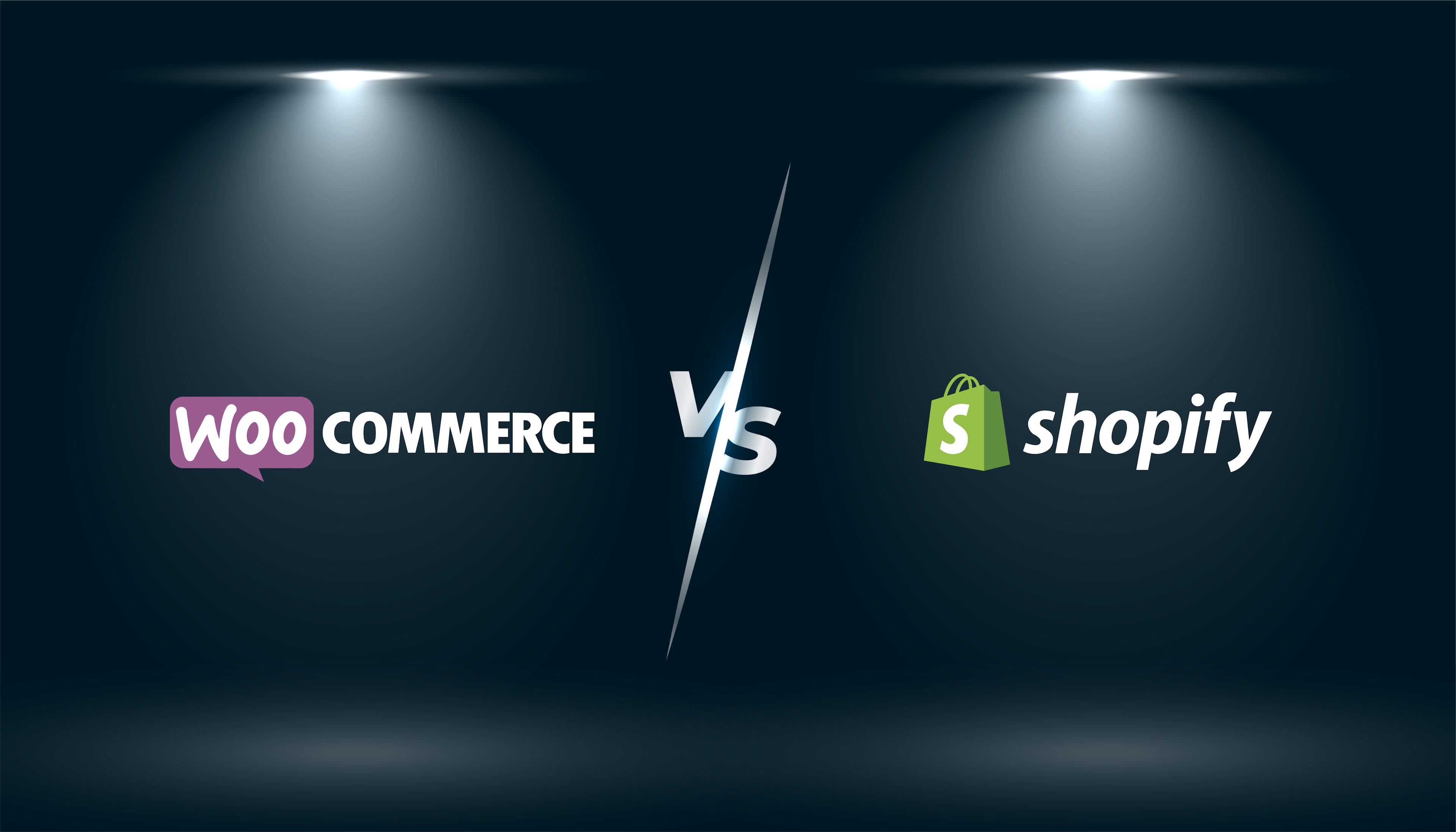
Starting an online store or migrating your online store to a new eCommerce platform can be time-consuming and expensive. Which is why you platform comparisons like these, where we'll be focussing on WooCommerce VS Shopify are always helpful.
To have your own online store that runs successfully means that you need to choose the eCommerce platform that suits the needs of your business best.
This is why we are comparing the WooCommerce platform VS the Shopify platform here together.
Allow us to help you make your decision and understand what sets both WooCommerce VS Shopify apart.
Shopify and WooCommerce are both popular eCommerce platforms, but they cater to different types of businesses.
We'll start our Shopify VS WooCommerce comparison by first introducing both eCommerce platforms, and then comparing WooCommerce and Shopifyy directly in key areas.
Now let's get into the eCommerce website builder comparison: WooCommerce VS Shopify.
WooCommerce
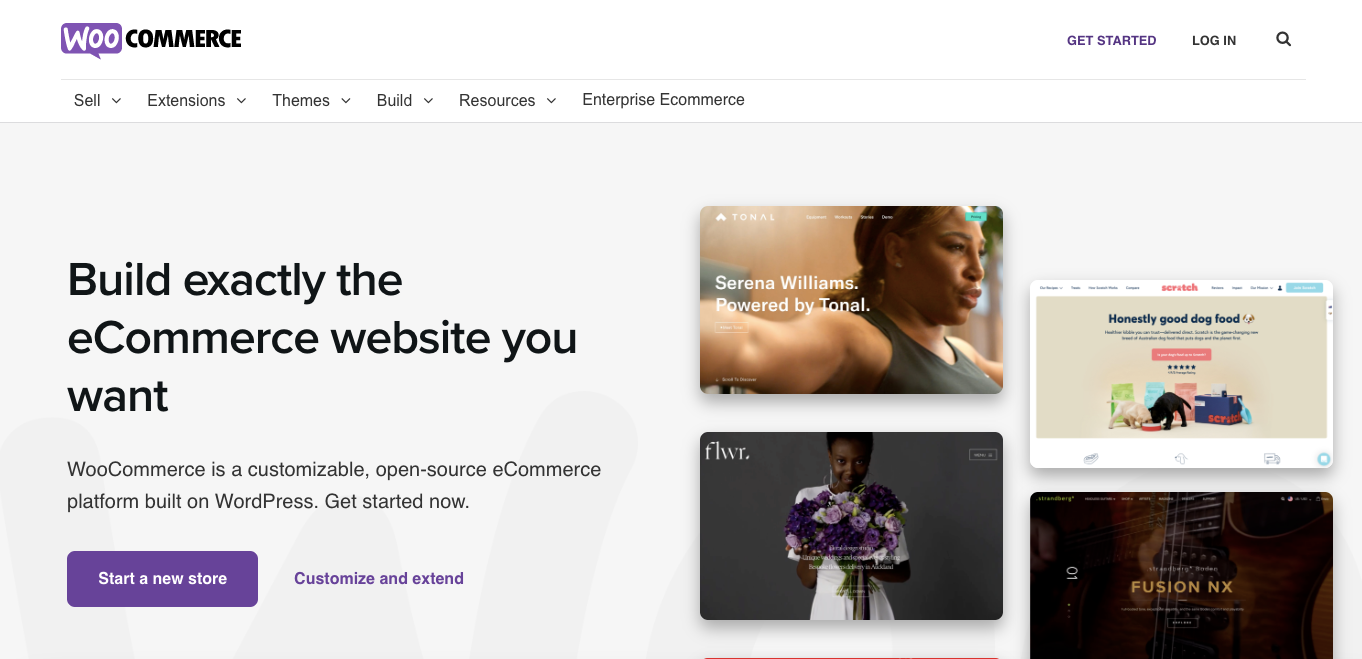
What is WooCommerce?
WooCommerce is an eCommerce plugin for the popular blogging platform WordPress that transforms your website into a fully featured eCommerce store. The reason a Wordpress site is known for its blogging functionality is because it was revolutionary when it came out, and the fact that adding well worded blogs might improve your search engine optimization, made it an attractive platform for businesses.
You can download and use WordPress and WooCommerce for free, which makes it an enticing option for small businesses with limited budget. WooCommerce is also powerful and customizable, making it a good choice for mid-size businesses that want intricate control of their eCommerce site.
What is a WordPress site?
As mentioned above, WooCommerce is a WordPress plugin. But what does that mean?
WordPress is a very popular self-hosted blogging software that you can use to set up blogs and websites on your own.
It's one of the most popular website software products out there, with millions of WordPress sites around the globe. Yet, a WordPress site doesn't include eCommerce store functionality from the get go.
This is where the WooCommerce plugin comes in. On WordPress websites, you can install so-called WordPress plugins, through which you can extend the functionality of your website.
There are thousands of WordPress plugin options for many different scenarios, and WooCommerce is the go-to solution to add eCommerce store functionality to your WordPress website.
That means, you either need an existing WordPress website, or you need to set up a new WordPress installation to start using WooCommerce and then creating your ideal WooCommerce store.
Moreover, it's important to understand, that WordPress is a self-hosted software and thus also the WooCommerce plugin is a self-hosted solution.
This offers more flexibility and control for businesses, but it also requires technical knowledge or a developer to set up and manage. Going for a WooCommerce store is not easy in its set up due to it being a self-hosted solution.
Let's highlight the WooCommerce benefits first, during this WooCommerce vs Shopify battle of the platforms!
WooCommerce Benefits
We'd like to give you some general insight into what WooCommerce is, before we dive into more precise information concerning this highly functional eCommerce business.
- A WooCommerce store is highly customizable – you can change almost any aspect of your store.
- It is free to use.
- This eCommerce platform is popular with developers – there are many plugins and extensions available.
- WooCommerce allows you to sell products in multiple currencies.
- They provide detailed sales reports for WooCommerce users to understand and reflect upon their online stores' performance.
- This platform is suitable for businesses of all sizes, but it works particularly well for small to medium-sized businesses.
- WooCommerce offers a wide range of features and plugins that you can benefit from, including SEO features.
Now let's take a look at Shopify in the WooCommerce vs Shopify comparison.
Shopify

What is Shopify?
Shopify is a platform that helps businesses create and manage their own online stores.
Shopify is simple to use and has a wide range of features, which makes it a viable option for businesses of all sizes.
Shopify – as a SaaS (software as a service) business – offers a fully hosted platform.
What does this mean?
The website and all its components are managed by Shopify themselves.
This simplifies the process for businesses and allows for easy scaling as the business grows.
Shopify also offers a wide range of themes and customization options, as well as integrations with various payment solutions and shipping providers.
We'd like to run through a few general points that make Shopify great so that you have a better understanding of what this platform is capable of.
- Shopify is simple to use – even for businesses that are not very tech-savvy.
- It has a wide range of features, including SEO features, which makes it suitable for businesses of all sizes.
- They offer 24/7 customer support.
- Shopify has a very user-friendly interface, making it easy to use.
- The platform is affordable as there are a variety of pricing plans to choose from. This means that online store owners can select the plan that suits their needs and their pockets best.
- They offer a wide range of payment options and accept a large variety of different payment gateways. They even boast their own called Shopify payments.
- Shopify allows you to sell products in multiple currencies, making scalability easy to implement.
- Shopify provides detailed sales reports and data analysis, giving your business better insight into performance and operations.
- Shopify has a very reliable hosting platform and is constantly working on updating their system and providing their Shopify merchants with the best technical support.
Now, we'd like to get into more detail about which eCommerce tools and eCommerce features Shopify offers its Shopify users and those that WooCommerce offers its WooCommerce users in this WooCommerce vs Shopify fight:
Now that you have a basic understanding of what each of these platforms has to offer, let us get into some more details.
We'll mention some important things to consider when creating your own online store, and then we will have a direct comparison between WooCommerce vs Shopify below each heading.
By the way, in case you are a research person, and feel like learning now about Shopify, why not take a read of our blog 'What is Shopify' too?
Let's go into a more specific comparison in the duel of WooCommerce vs Shopify...
Design – Themes and Templates
WooCommerce themes
https://woocommerce.com/product-category/themes/
WooCommerce offers a wide range of templates to choose from, making it easy for businesses to find a design that suits their needs.
WooCommerce has a library of over 2,000 templates.
- There are both free and premium templates available, with a variety of designs to choose from. By the way, the free WooCommerce themes are great too!
- WooCommerce allows you to easily customize your template to match your brand.
- The WooCommerce team regularly releases new templates, so businesses can always find the latest designs.
If you are unimpressed with the WooCommerce themes, you can also sign up for WordPress and use the WordPress themes and then add WooCommerce as a plugin later on.
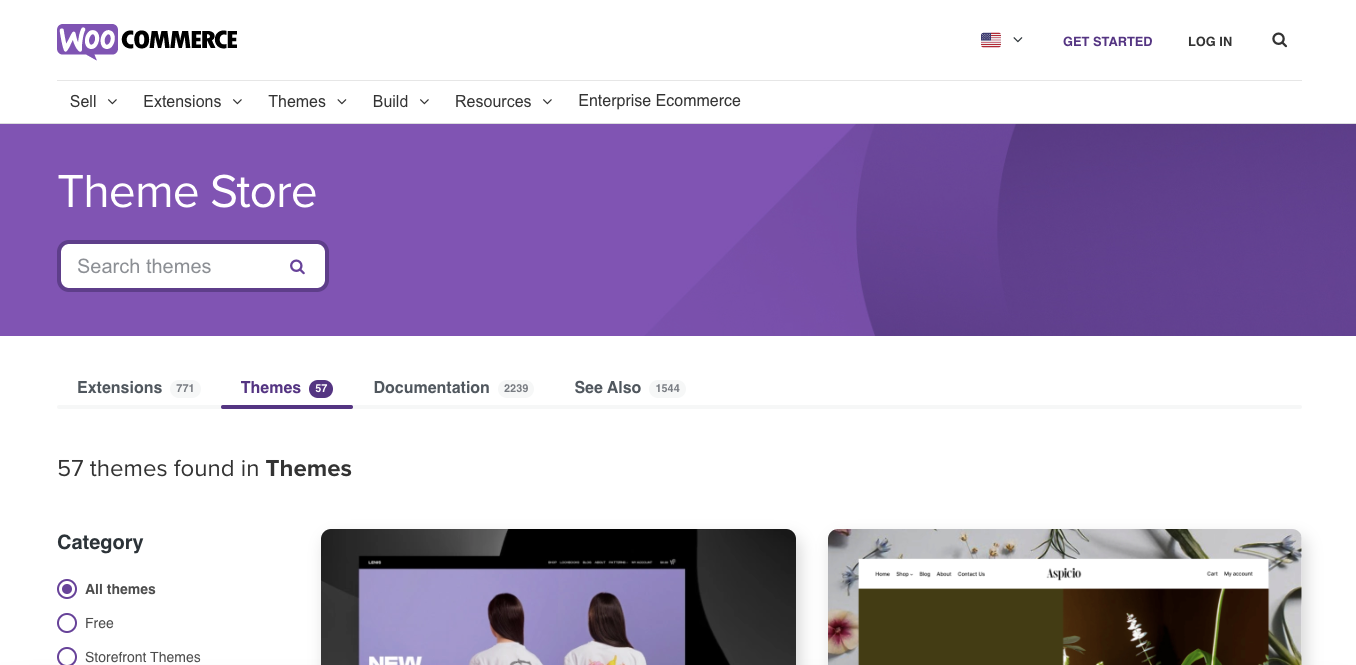
Let's look at Shopify's themes now in the WooCommerce vs Shopify contrast.
Shopify themes
There are a wide variety of Shopify themes to choose from, with both free and premium options available.
Using a Shopify theme to create your Shopify store is beneficial, as it lightens the workload of you needing to create your website's interface from scratch.
The Shopify theme store offers a wide range of options to pick from, which is great as you get to choose a design that suits your needs best. Your eCommerce site can look stellar as a free plan or with one of the paid premium themes.
These templates are often created with the industry in mind. There will be themes available that suit the food industry, for example, or there will be specific Shopify themes available that suit the apparel industry and so on.
Shopify offers a wide range of themes that cater to a variety of businesses, and businesses can easily customize these themes to match their brand.
Shopify has over 100 different themes available.

Web hosting
WooCommerce vs Shopify
WooCommerce web hosting
WooCommerce is a self-hosted platform that runs on top of WordPress. This means that you need to add WooCommerce as a plugin to your WordPress site. The WordPress site itself must be installed and hosted on a web server.
This web hosting can happen on your own server, if you have the space and capacity to add such a machine to your office. Or you can set up a hosting account with one of the many hosting providers out there. In this case, the hosting provider will take care of running the server, while you take care of the software and maintenance of it.
Shopify web hosting
Shopify, on the other hand, is a hosted eCommerce platform and hence fully hosted by Shopify themselves.
This means the website, software and all its components are managed by Shopify and Shopify is your hosting provider.
This setup is far easier to maintain, especially if you do not have the tech knowledge that is required to run and maintain a complicated piece of software (like a dedicated eCommerce platform) on your own.
WooCommerce plugins & Shopify apps
Both Shopify and WooCommerce allow extensions but with Shopify these are referred to as apps and with WooCommerce they're referred to as plugins (or addons).
Why is this? Because they are different in technical terms but they're a bit like two sides of the same coin.
When you have a hosted platform, like WordPress/WooCommerce, you can install addons. Whereas when you have a SaaS platform, like Shopify, you can install apps. So it's the way the platform is set up, which determines whether you use plugins or apps.
Let's give a bit more context: What are Ecommerce plugins?
A plugin is a software extension that adds new features or functionality to an existing software application.
In the context of WooCommerce, the plugins are used to add features such as payment processing, shipping, or inventory management. There are a wide variety of plugins available, and businesses can find one to suit their specific needs.
WooCommerce plugins
WooCommerce is a plugin itself and creating an online store using both WooCommerce and Wordpress, means that you will have the option of adding loads of plugins to better your store.
Wordpress has plenty of plugins, so you do not need to use Wordpress plugins if you don't want to, however, Wordpress does have 60 000 + free plugins available which is an insane amount.
What is an app?
An app, fully named application, is a software that bundles together certain features in a way that is accessible to a user.
Apps on the Shopify app Store
With Shopify, they are called apps and all you need to do is go to the Shopify app store where more than 7000+ apps await you.
These apps let users expand their online store with additional features and functionalities.
Payment gateways
How eCommerce stores accept payments is a vital part of any eCommerce store. Whether you have a WooCommerce eCommerce store or a Shopify eCmmerce store. The payment gateway comparison between WooCommerce vs Shopify is vital.
WooCommerce accepted payment gateways
https://woocommerce.com/product-category/woocommerce-extensions/payment-gateways/
WooCommerce offers different payment gateway extensions depending on the country. As you can see from the image below, we have chosen Germany, to which, 14 free payments gateways pop up.
These include: Stripe, WooCommerce payments, Amazon Pay, PayPal Payments, Braintree, Klarna, Mollie etc.
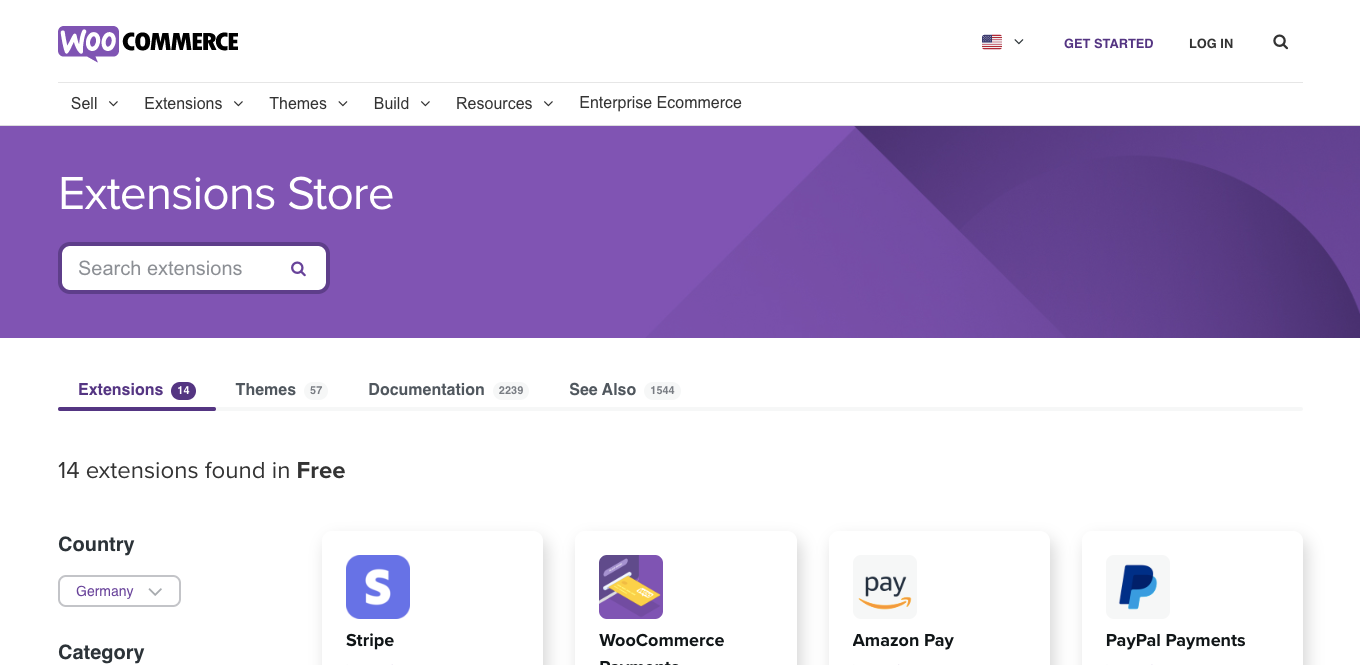
Shopify accepted payment gateways
https://www.shopify.com/payment-gateways/germany
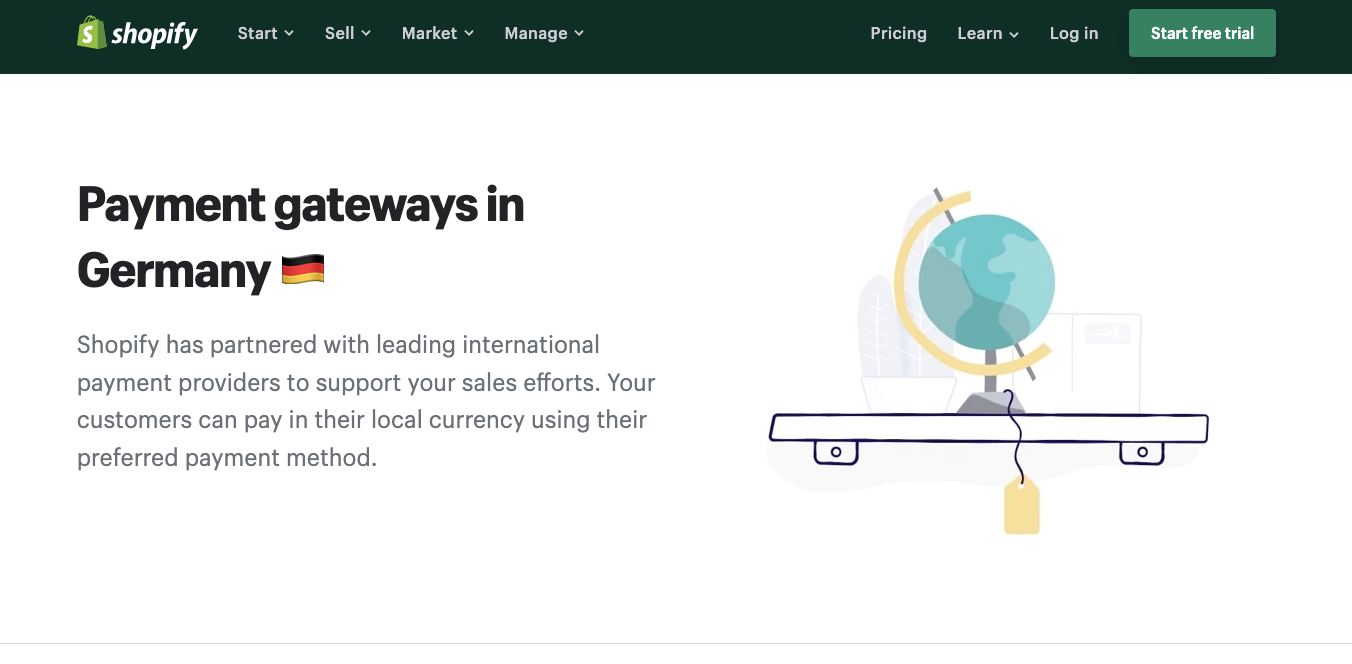
Shopify offers many gateway solutions for eCommerce stores.
You can categorize these easily on the Shopify website, as they have divided this information between continent and then between country. For this instance, we have chosen Germany.
The Shopify payment gateways include: Amazon Pay, Klarna, Mollie, PayPal, Amex, etc
Shopify also have its own payment service provider called Shopify Payments. This nifty eCommerce tool allows businesses to accept payments online without the need of a third-party payment gateway.
If you would like to learn more about Shopify Payments, read our blog here: Shopify Payments.
The cost of WooCommerce VS Shopify
WooCommerce Store
WooCommerce is a plugin and it is free. There is no cost for WooCommerce. However, you will need to remember that you need to pay for a domain name, get your SSL certificate (sometimes eCommerce platforms have deals where you can get a free SSL certificate if you sign up with them) and a hosting provider fee. Moreover, there is typically higher cost involved with updating and maintaining a WooCommerce store compared to a Shopify store.
Shopify store
Shopify has 5 different plans for anyone wanting an online store.
The Shopify pricing model is fair and inclusive, and it is up to your discretion to choose the Shopify plan that suits the needs of your business best.
- Starter plan– $5 per month
- Basic Shopify plan– $29 per month
- Shopify plan – $79 per month
- Advanced Shopify plan – $299 per month
- Shopify Plus plan – starts at $2000 per month
If you would like to know more about the cost of Shopify, please read our blog 'Shopify Plans and Pricing' here. This also includes which eCommerce features and services you can expect from each plan.
Conclusion
Both Shopify and WooCommerce are dedicated eCommerce platforms that offer their users the best service.
Each of these options offer incredible eCommerce functionality. Shopify sites, so the hosted eCommerce platform, is reliable, safe, easy to use, boasts great features and allows Shopify users to install beneficial apps.
WooCommerce online stores use WooCommerce as a plugin and are built on a WordPress site.
With WooCommerce, you can build incredible eCommerce websites, however, due to the technical structure of WooCommerce as a WordPress, you will need to be more tech-savvy to work this one out. Having an official Woocommerce website is no easy feat, it takes tech knowldge for sure!
WooCommerce also has a larger selection of customizable themes and plugins, but has fewer integrations with payment solutions and shipping providers.
Ultimately, the choice between Shopify and WooCommerce depends on the needs and resources of the business. Shopify is a good option for businesses that want a simplified platform with easy scaling capabilities, while WooCommerce appeals to those who want more control and flexibility.
Should you wish to go with a Shopify website, please do get in touch with us. We are Shopify experts and Shopify partners and would love to help you build your website. Send us an email on hello@especial.digital or visit our website here.
Found this helpful? Share this post with your colleagues and friends

Natalie Miller
Marketing ManagerCONTACT
Would you like to know more?
Let us help you!

Don't want to miss anything?
Subscribe to the Especial Newsletter now and stay up to date with all our exciting ecommerce news!